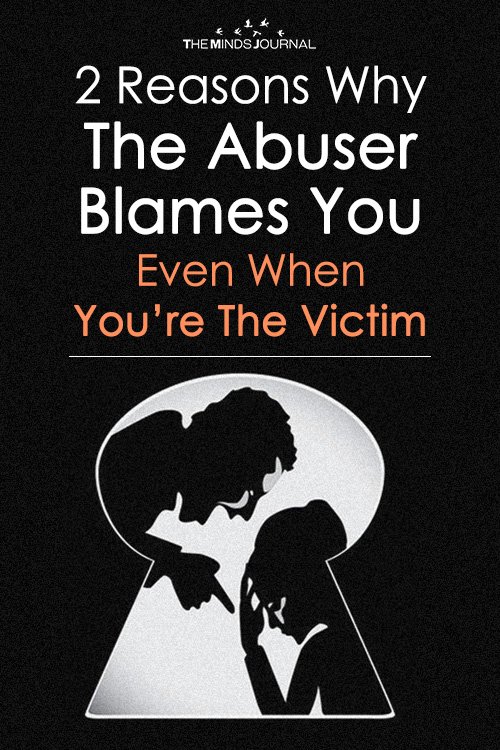Are you the victim of narcissistic abuse? Are you still trying to figure out the rationale behind their blame shifting game? How can an abuser blame you even when you are the victim?
To start off with, let’s just say that narcissism is not self-love. Narcissism is the overwhelming sense of superiority and perfection that one has for self. And even though they might come across as someone with a seemingly strong personality in the first meeting, over time you will realize that they lack true self-confidence and core.
They make it look like there is little that they care about others’ opinion for them but the reality happens to be completely opposite. Narcissists thrive for validation and they choose to surround themselves with only those people who constantly shower them with compliments.
The main issue with sociopaths and narcissists isn’t their behavior. It’s trying to build any kind of relationship with them.
Be it as friends or life partners, there are very fewer chances of them making an effort to move in your direction to come mid-way. They will frustrate you to a point from where you will start taking all the blames on yourself and feel that you are responsible for their behaviour towards you and that’s clearly not something anyone wants to feel. They know how to turn tables in a way that the ball is always in their court.
They are manipulative beings who know how to use your psychology against you. In short, there are too many blame shifting games involved in being with a sociopath. The accusing fingers of a narcissist will always find a victim to point their blames on.
Related: Narcissists Will Never Stop Lying to You
But before we tell you why narcissists and sociopaths indulge in blame shifting even though they are at fault, we think it’s necessary for you to know the traits of a narcissist. This is going to help you see the red signs clearly if there are any at all.
Following are the personality traits of a narcissist:
– constant feeling of being superior than the others (they don’t really check the level of the sea they are in, but when it comes to comparing, they always feel like they are better than the rest, even if their levels of achievements beg to differ)
– Entitlement to success, power, beauty, and excellence.
– They think that understanding them is beyond the capabilities of a normal person.
– No regards for others emotions. Not empathetic towards anyone but themselves
– Manipulative
– Arrogant body language and extremely hot-headed.
No matter how similar sociopaths and narcissists seem to be, sociopaths have a few more qualities in addition which makes them terrible partners.
Following are the personality traits of sociopaths:
-Dishonesty
-Rebellious without a cause
-Hasty
-Hostile and assertive
-Careless
-No consideration for others pain
-They lack the sense of safety when it comes to others.
Now that you are aware of the characteristics of sociopaths and narcissist, it’s time you sit down and see the number of boxes you can tick while thinking about a specific person. If some of the points match then it’s ok because we all have our different sets of imperfections.
But if the ticks are alarmingly high in number then take the red signs as a clear hint. They will do everything in their power to make you believe that the faults have always been in you. You need to protect your mental health and heart from such people because they won’t think twice before ruining it.
Related: 3 Mental States That Narcissists and Sociopaths Manipulate in Others
Now that you know what they do and how they do it, you might be intrigued to know as to why they do it to people who love them and we have an answer for that.
There are two main reasons behind the blame shifting
and the way they behave even though that can’t act a justification, you should still be aware.
Reason 1- A Never-ending feeling of superiority
For a narcissist, it’s impossible to believe that he/she can be wrong, ever.
They think of themselves to be a white page with absolutely no spots. They certainly deny the fact that each and every human walking on the surface of the earth is imperfect in one way or the other and that it is absolutely human to be wrong sometimes. But this is something they just can’t come to terms with. They have a never-ending urge to make others feel like they deserve better than them and that they are entitled to power.
This point acts as the main reason why maintaining any kind of bond with narcissists and sociopath becomes impossible. The key element that binds relationships of any kind together is the act of apologizing and forgiving. No relationship will last if it’s just one person making all the effort. It takes two to make things work, even as friends.
Related: 11 Ways Narcissists Use Shame to Control
Reason 2- Dumping the load on your shoulder
It is often said that the best way to kill something is to keep telling them how awful they are. And even though constantly repeating lies doesn’t change the truth, it does make your brain fall for it, even for a while.
One of the worst feelings ever is to feel guilty about something you didn’t even do. Narcissists prefer dumping blames on others shoulders rather than taking authority of their actions. In situations like these, it is your responsibility to know what’s best for you and walk away even if it hurts a lot in that moment.
Related: These Are The 7 Signs Of A Hypocrite And The People They Target
Before you go:
No matter which phase of life you are in, you should remind yourself that you deserve nothing but the best of beautiful. You are worth a lot and if there is someone who makes you feel small about yourself, then no matter how much you love them, you have to let them go. They say, how you treat yourself is how you teach others to treat you. You deserve to be with someone who is willing to make things possible.
Relationships just don’t survive all by themselves. They need to be nurtured and protected like a baby. And you should know at all times that you need to leave the table when love and mutual respect is no longer being served.
The Minds Journal Articles Volume -1 is Copyright Protected vide Regd.# L-103222/2021











Leave a Reply